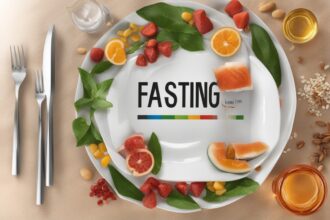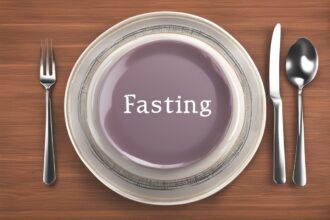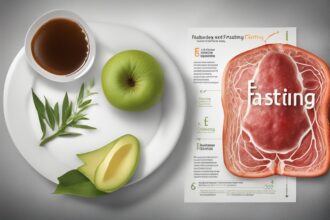Hey there, health enthusiasts! If you’ve been exploring ways to boost your wellness, you’ve likely stumbled upon the incredible fasting benefits that everyone’s talking about. From weight loss to mental clarity, fasting has become a go-to strategy for many. But did you know that one of the most profound effects of fasting lies in its ability to combat oxidative stress—a sneaky culprit behind aging and chronic diseases? In this deep dive, we’ll unpack the science behind fasting and oxidative stress, explore how fasting can be a game-changer for your cellular health, and share practical tips to harness these benefits. Let’s get started on this fascinating journey to better health!
What Is Oxidative Stress, and Why Should You Care?
Oxidative stress might sound like a buzzword, but it’s a real biological process that affects every cell in your body. Simply put, it’s an imbalance between free radicals (unstable molecules that can damage cells) and antioxidants (compounds that neutralize them). When free radicals outnumber antioxidants, they can wreak havoc on your DNA, proteins, and lipids, contributing to aging, inflammation, and diseases like cancer, diabetes, and heart disease (Halliwell & Gutteridge, 2015).
Every day, your body produces free radicals as a byproduct of normal processes like metabolism. External factors like pollution, poor diet, and stress can ramp up their production too. This is where the fasting benefits come into play—fasting may help tip the balance back in your favor by reducing oxidative damage and boosting your body’s natural defenses. But how does it work? Let’s dive deeper.
How Fasting Reduces Oxidative Stress: The Science Behind It
Fasting, whether it’s intermittent fasting (IF), time-restricted eating, or prolonged fasts, triggers a cascade of cellular changes that can protect against oxidative stress. When you fast, your body shifts from burning glucose to using stored fats for energy, a process called ketosis. This metabolic switch not only helps with weight management but also reduces the production of free radicals in mitochondria—the powerhouses of your cells (Mattson & Wan, 2005).
Moreover, fasting activates pathways like autophagy, a cellular “clean-up” process that removes damaged components and helps recycle them into new, healthy structures. Studies suggest that autophagy, ramped up during fasting, can mitigate oxidative damage by clearing out dysfunctional mitochondria that leak free radicals (Rubinsztein et al., 2011). This is one of the key fasting health benefits
Fasting Benefits for Long-Term Health and Aging
One of the most exciting aspects of fasting is its potential to slow down aging by tackling oxidative stress. As oxidative damage accumulates over time, it accelerates the aging process and increases the risk of age-related diseases. By reducing free radical production and enhancing antioxidant defenses, fasting may help protect tissues and organs, keeping you healthier for longer (Fontana & Partridge, 2015).
For example, research on calorie restriction—a close cousin of fasting—has shown that reducing food intake over extended periods can extend lifespan in animal models by minimizing oxidative stress. While human studies are still ongoing, early evidence suggests that intermittent fasting can lower markers of oxidative damage, such as lipid peroxidation, in the body (Harvie et al., 2011). This means that incorporating fasting into your routine could be a powerful anti-aging strategy alongside other fasting advantages like improved metabolism and energy levels.
Types of Fasting to Combat Oxidative Stress
Not all fasting methods are created equal, and choosing the right one can maximize the fasting benefits for oxidative stress reduction. Here are a few popular approaches to consider:
- Intermittent Fasting (16/8 Method): Fast for 16 hours and eat during an 8-hour window. This method is sustainable for many and has been linked to reduced oxidative stress markers.
- 5:2 Fasting: Eat normally for 5 days a week and restrict calories (500–600) on 2 non-consecutive days. It’s a flexible way to gain fasting health benefits without daily restrictions.
- Time-Restricted Eating: Limit eating to a specific window each day (e.g., 12 pm to 8 pm). This aligns with your circadian rhythm and may enhance cellular repair processes.
- Prolonged Fasting: Fasting for 24–72 hours, often under medical supervision. This can trigger deeper autophagy, amplifying protection against oxidative damage.
Remember, the best fasting method is one that fits your lifestyle. Start slow if you’re new to fasting, and always consult a healthcare provider if you have underlying conditions.
Practical Tips to Enhance Fasting Benefits for Oxidative Stress
While fasting alone offers impressive benefits, pairing it with smart habits can supercharge its effects on oxidative stress. Here are some actionable tips to get the most out of your fasting journey:
- Stay Hydrated: Drink plenty of water during fasting periods to support detoxification and prevent dehydration, which can exacerbate oxidative stress.
- Eat Antioxidant-Rich Foods: Break your fast with foods high in antioxidants, like berries, leafy greens, and nuts, to bolster your body’s defenses.
- Avoid Overeating: After fasting, resist the urge to binge. Overeating can spike blood sugar and undo some of the fasting advantages by increasing free radical production.
- Manage Stress: Combine fasting with mindfulness practices like meditation. Chronic stress fuels oxidative damage, so staying calm enhances fasting’s protective effects.
- Get Enough Sleep: Quality rest supports cellular repair and works synergistically with fasting to reduce oxidative stress.
These small tweaks can make a big difference in how your body responds to fasting. It’s all about creating a holistic approach to wellness that amplifies the health benefits of fasting.
Who Should Be Cautious with Fasting?
While the fasting benefits for oxidative stress are compelling, fasting isn’t a one-size-fits-all solution. Certain groups should approach it with caution or avoid it altogether. Pregnant or breastfeeding women, individuals with eating disorders, and those with medical conditions like diabetes or low blood pressure should consult a doctor before starting any fasting regimen. Fasting can also be stressful on the body if done improperly, potentially increasing oxidative stress rather than reducing it in some cases (Longo & Mattson, 2014). Listening to your body and seeking professional guidance is key to safely reaping the rewards of fasting.
As we wrap up, it’s clear that the link between fasting and oxidative stress is a powerful one. The fasting benefits extend far beyond weight loss—they touch the very core of cellular health, protecting against damage and potentially slowing the aging process. By incorporating fasting into your routine, whether through intermittent fasting or time-restricted eating, you’re giving your body a chance to reset, repair, and thrive. Pair it with a balanced diet, hydration, and stress management, and you’ve got a recipe for long-term wellness. So, why not give fasting a try? Start small, stay consistent, and watch how your body responds. Here’s to healthier, happier cells—and a healthier, happier you!
References
- Fontana, L., & Partridge, L. (2015). Promoting health and longevity through diet: From model organisms to humans. Cell, 161(1), 106–118. https://doi.org/10.1016/j.cell.2015.02.020
- Halliwell, B., & Gutteridge, J. M. (2015). Free radicals in biology and medicine (5th ed.). Oxford University Press.
- Harvie, M. N., Pegington, M., Mattson, M. P., Frystyk, J., Dillon, B., Evans, G., … & Howell, A. (2011). The effects of intermittent or continuous energy restriction on weight loss and metabolic disease risk markers: A randomized trial in young overweight women. International Journal of Obesity, 35(5), 714–727. https://doi.org/10.1038/ijo.2010.171
- Longo, V. D., & Mattson, M. P. (2014). Fasting: Molecular mechanisms and clinical applications. Cell Metabolism, 19(2), 181–192. https://doi.org/10.1016/j.cmet.2013.12.008
- Mattson, M. P., & Wan, R. (2005). Beneficial effects of intermittent fasting and caloric restriction on the cardiovascular and cerebrovascular systems. The Journal of Nutritional Biochemistry, 16(3), 129–137. https://doi.org/10.1016/j.jnutbio.2004.12.007
- Cell, 146(5), 682–695. https://doi.org/10.1016/j.cell.2011.07.030






